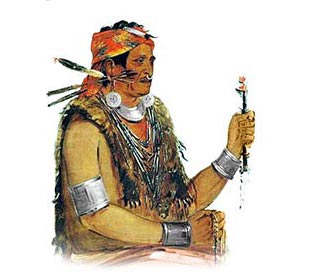History of Georgia Indians - The French Indian Wars
The French and Indian Wars (1688 - 1763) was a generic names for a series of wars, battles and conflicts involving the French colonies in Canada and Louisiana and the 13 British colonies, which included Georgia, consisting of King William's War (1688-1699), Queen Anne's War (1702-1713), King George's War (1744 - 1748) and the French and Indian War aka the Seven Years War (1754-1763). Various Georgia Indian tribes were allied to the French and British colonies during the French Indian Wars which raged for nearly 75 years. Fast Facts about the History of Georgia Indians
The climate, land, history, environment and natural resources that were available to the indigenous Indian tribes in Georgia resulted in the adoption of the Southeast culture. - Name of State: Georgia
- Meaning of State name: Named after King George II of England in 1733. The terms of the charter granted by the king specified that the colony (to be founded by James Oglethorpe) was named after the king.
- Geography, Environment and Characteristics of the State of Georgia: Blue Ridge Mountains, rivers; coastal plain areas and coastal flatlands.
- Culture adopted by Georgia Indians: Southeast Cultural Group
- Languages: Muskogean
- Way of Life (Lifestyle): Hunter gatherers and hunter farmers
- Types of housing, homes or shelters: Asi Wattle and Daub houses
History Timeline of the Georgia Indians - 10,000 BC: The first indigenous people were of the Paleo-Indian culture who lived in caves or were Nomadic Hunters
- 7000 BC: Archaic Period in which people built basic shelters and made stone weapons and stone tools
- 2500 BC: Gulf Formational Period of the Southeast culture group with development of ceramics and pottery
- 1000 AD: Woodland period with permanent houses and farming
- 1300: Mississippian culture period of Mound builders
- 1498: John Cabot explores the coast of Georgia
- 1526: First colony established by Lucas Vazques de Ayllon
- 1540: Hernando de Soto explores Georgia
- 1688: 1688 - 1763 The French and Indian Wars between France and Great Britain for lands in North America consisting of King William's War (1688-1699), Queen Anne's War (1702-1713), King George's War (1744 - 1748) and the French and Indian War aka the Seven Years War (1754-1763)
- 1702: (1702-1713) Queen Anne's War (part of the French and Indian Wars) between the French and Spanish colonies allied with the Wabanaki Confederacy, Mohawk, Choctaw, Timucua, Apalachee and Natchez tribes against the British colonies allied with the Muscogee (Creek), Chickasaw and Yamasee tribes.
- 1733: The first Creek Indian cession
- 1754: 1754 - 1763: The French Indian War is won by Great Britain against the French so ending the series of conflicts known as the French and Indian Wars
- 1763: Treaty of Paris
- 1775: 1775 - 1783 - The American Revolution.
- 1776: 1776-1794 Chickamauga Wars aka the Second Cherokee War, a series of conflicts of the Cherokee against the encroachment into their territory.
- 1776: July 4, 1776 - United States Declaration of Independence
- 1803: The United States bought the Louisiana Territory from France for 15 million dollars for the land
- 1812: 1812 - 1815: The War of 1812 between U.S. and Great Britain, ended in a stalemate but confirmed America's Independence
- 1813: Creek War (1813–1814) erupted in Alabama and Georgia. The Creek Indians were defeated by American forces led by Andrew Jackson at Talladega in 1813, at Emuckfau, in 1814, at Enotochopco in 1814 and finally at the Horseshoe Bend of the Tallapoosa River when 750 Creeks were killed or drowned, and 201 whites were killed or wounded.
- 1825: Creek Chiefs cede all Creek lands in Georgia to the United States in Treaty of Indian Springs
- 1830: Indian Removal Act
- 1832: Department of Indian Affairs established
- 1832: 1832-1839: Removal of the Seminole, Cherokee, Chickasaw, Choctaw and Creek Indians, known as the "Five Civilized Tribes" to Indian Territory on the Trail of Tears
- 1836:1836 - 1837: The Second Creek War (Seminole War)
- 1861: 1861 - 1865: The American Civil War.
- 1862: U.S. Congress passes Homestead Act opening the Great Plains to settlers
- 1865: The surrender of Robert E. Lee on April 9 1865 signalled the end of the Confederacy
- 1887: Dawes General Allotment Act passed by Congress leads to the break up of the large Indian Reservations and the sale of Indian lands to white settlers
- 1969: All Indians declared citizens of U.S.
- 1979: American Indian Religious Freedom Act was passed
|
